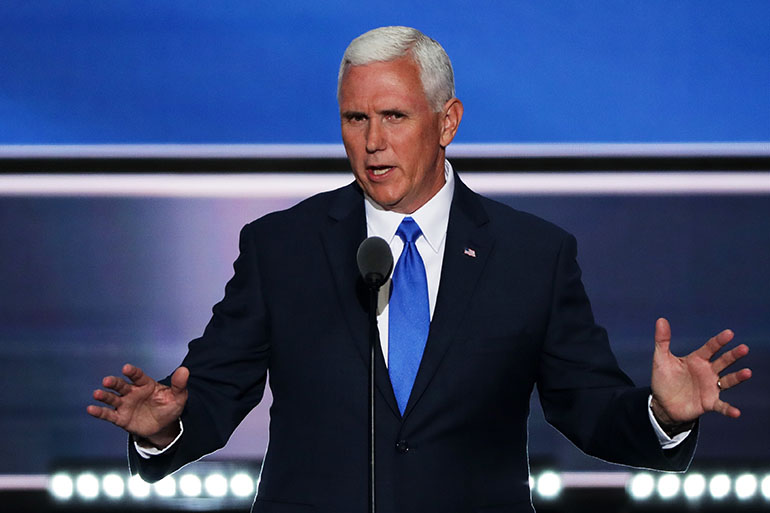Indiana Gov. Mike Pence is in the spotlight this week as the man Donald Trump has picked to be his running mate. Pence’s decisions about health and health care in Indiana have drawn attention from within and outside the state. His record could be important in November, because Trump doesn’t have a legislative record at all.
Here’s a quick look at the governor’s history in terms of health policy in Indiana.
Medicaid Expansion
Pence has always been a vocal opponent of the Affordable Care Act, even after the federal law passed in 2010 and was upheld by the Supreme Court.
But when faced with the choice of whether to expand Medicaid to cover Indiana residents who earn incomes that are 138 percent or below the federal poverty level — a key part of the ACA — Pence made a compromise. He debuted a conservative-friendly version of the expansion, one that requires Medicaid recipients to pay a monthly contribution, based on income, into a health savings account. Recipients who miss a payment can be bumped to a lower level of coverage, or lose it entirely, for six months.
Now, after a year and a half, the Healthy Indiana Plan, or HIP 2.0, has enrolled about 190,000 more people into health coverage.
Caitlin Priest, director of public policy at Covering Kids & Families of Indiana, said the plan has helped many people get health insurance for the first time in their lives.
“It’s really been a wonderful way to move the needle both on health care access and ultimately on long-term health outcomes,” Priest said.
Pence took criticism from the right for accepting a component of Obamacare, but his conservative tweaks to Medicaid have other Republican-led states looking at that model.
HIV Outbreak
Pence drew criticism from local and national infectious disease experts for his response to an urgent health crisis in Indiana. In February 2015, the state reported an outbreak of HIV in Scott County, blamed on opioid addiction and needle sharing.
It got so bad — growing to more than 80 cases in the month after the announcement, and more than 190 to date — that the CDC came to Indiana to investigate, and public health experts began calling for a needle exchange. At the time, syringe exchanges were illegal in the state and Pence was opposed to changing that, at first.
He later signed an emergency declaration allowing Scott County to start a needle exchange program. Rather than legalize such exchanges statewide, Pence signed a bill that forces counties to ask permission to start a needle exchange.
Only a few counties have done it, so far, because the process takes a lot of planning, local support and money, which the state doesn’t provide, said Carrie Lawrence, a researcher with the Rural Center for AIDS/STD Prevention.
“If you’re the health department with only two part-time staff, and a full-time health director, who’s going to do this, and when is it going to happen?” Lawrence said.
Public Health Budgets
The HIV crisis also brought some attention to Indiana’s lack of public health funding in general, Lawrence said.
“I think we are dealing with the consequences of the fact that that we don’t have a strong infrastructure for public health in the state,” she said.
As governor, Pence signed legislation that slashed Indiana’s budget for public health programs, despite the state’s many pressing public health problems. Indiana has a high smoking rate, high obesity rate, and high infant mortality rate. The state is ranked nearly last for both federal and state public health funding. According to Trust for America’s Health, Indiana spends just $12.40 per resident on public health. West Virginia, in contrast, spends more than $220.
As a member of Congress from 2001 to 2013, Pence voted against funding for health programs such as the State Children’s Health Insurance Program and the Prevention and Public Health Fund.
Abortion Access
As a congressman, Pence was an early advocate for defunding Planned Parenthood, and this year, women’s health advocates have clashed with him again.
In March, the governor signed a bill that’s been cited as one of the most restrictive in the U.S., barring abortion on the basis of disability, gender or race of the fetus. It also requires women to get an ultrasound at least 18 hours before the procedure and requires that the fetal remains be buried or cremated.
Some Indiana women responded by updating the governor’s office with (sometimes graphic) news on their menstrual cycles by phone and on social media with hashtag #periodsforpence. The social media backlash mirrors #periodsarenotaninsult, which took aim at Donald Trump last year.
The Indiana ACLU brought a lawsuit against the state’s abortion restrictions — and a judge has since blocked portions of that law. “What the state of Indiana has attempted to do here … grossly flies in the face of existing law,” saidACLU attorney Ken Falk.
This story is part of a reporting partnership that includes Side Effects Public Media, NPR and Kaiser Health News.








